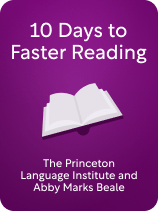

This article is an excerpt from the Shortform book guide to "10 Days to Faster Reading" by The Princeton Language Institute and Abby Marks Beale. Shortform has the world's best summaries and analyses of books you should be reading.
Like this article? Sign up for a free trial here.
How would your life change if you could read faster? What opportunities would open up?
It’s probably obvious that speed-reading enables you to read more. But, it also can improve your focus on—as well as the comprehension and memory of—what you read, give you more joy and confidence in reading, and broaden your expertise.
Let’s dive into the details of these benefits of speed-reading.
Benefit #1: Improve Your Focus, Comprehension, & Memory of What You Read
The first benefit of speed-reading is actually a bundle of advantages. According to the authors of 10 Days to Faster Reading, when you employ the skills associated with speed-reading, you concentrate more closely on what you’re reading. This leads to better comprehension—if you’re paying close attention to the text, you’re more likely to understand the information within it. Finally, a higher level of focus and comprehension helps you to form stronger memories of what you read.
| The Relationship Between Speed-Reading, Focus, and Comprehension According to some experts, speed-reading improves focus because it forces our brains to absorb a lot of information in a limited time window. With so much to process, we’re far less likely to get distracted, as our brains have to concentrate to complete the task. Additionally, practicing speed-reading techniques frequently is like exercise for the brain, continually improving its performance. This leads to improved information processing and memory formation, allowing us to recall more and more information. However, other research suggests that in some situations, speed-reading and good comprehension may be incompatible. One study found that doubling or tripling reading speeds led to less accurate comprehension of a text. Therefore, speed-reading may be best when we only need a surface understanding of a text, but not when we need a complete, complex understanding of the subject matter. |
Benefit #2: Increase the Volume of Material You Read
The authors argue that as you learn speed-reading skills, you get through reading material more quickly and can therefore read a larger quantity of texts. After practicing your skills, you may be able to get through certain texts by just skimming them, increasing your speed even further.
| The Benefits of Reading More Some experts argue that reading more improves our ability to communicate. First, reading a greater volume of material exposes us to more vocabulary, enabling us to express our thoughts more eloquently and accurately. Second, reading widely gives us more topics to talk about, making us better conversationalists. It also leads to a deeper understanding of ideas, perspectives, and events, which we can then impart to others. Finally, reading about other people’s viewpoints and experiences encourages us to empathize with them and thus communicate with greater understanding and compassion. Though skimming will likely help you read more, it won’t necessarily lead to all of these benefits. You may be able to gather interesting talking points and learn new words by skimming texts, but you likely won’t be able to gain the in-depth understanding of the authors’ ideas that improves your empathy and communication. Some argue that skimming is best used in the following situations: • You have a limited time to get through a lot of reading material. • There are portions of the text that aren’t useful to you. • The text is nonfiction. • You already have background knowledge of the topic. |
Benefit #3: Reading With Joy & Confidence
The authors say speed-reading strategies increase your enjoyment of reading due to increased confidence in your abilities as you master the techniques. Increased confidence makes reading an activity to enjoy freely rather than something to avoid because you feel insecure about it.
(Shortform note: By increasing your enjoyment of reading and confidence in your reading ability, speed-reading may have the added benefit of nudging you to tackle any reading you’ve been procrastinating on. According to Piers Steel in The Procrastination Equation, we’re far more likely to procrastinate on tasks we don’t enjoy. The less we enjoy a task, the less value we place on it, and we tend to avoid tasks we deem less valuable. Likewise, we’re more likely to procrastinate on tasks when we lack confidence that we’ll be able to complete them successfully. We delay them because we don’t want to risk the pain of failure, no matter how beneficial they are to us.)
Benefit #4: Broaden Your Professional Expertise
Finally, the authors assert that reading more efficiently and effectively can contribute to greater professional success. Reading is necessary for keeping up with the latest news and developments in any professional field. However, there’s often so much material to get through that it feels too overwhelming, especially on top of your regular work. By reading more, faster, and with greater competence, you can stay on top of developments in your field and become more knowledgeable in your role.
(Shortform note: In Eat That Frog!, Brian Tracy also names reading as a key way to build your skills as a professional in any field. He argues that regular skill-building is vital because it gives you the confidence to dive into challenging tasks, saves time by making you better and faster at completing your work, and helps you advance your career. He suggests reading about your field or industry daily. Additionally, he advises incorporating books and articles about personal development and productivity into your reading repertoire.)

———End of Preview———
Like what you just read? Read the rest of the world's best book summary and analysis of The Princeton Language Institute and Abby Marks Beale's "10 Days to Faster Reading" at Shortform.
Here's what you'll find in our full 10 Days to Faster Reading summary:
- Speed-reading techniques to help you learn more efficiently
- How to rid yourself of the common unhelpful reading habits
- How to teach your eyes to take in more information at once






